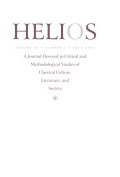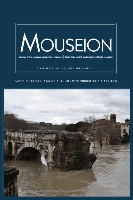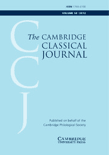
QUADERNI URBINATI DI CULTURA CLASSICA
Scope & Guideline
Unveiling Insights in Literature and Language
Introduction
Aims and Scopes
- Classical Literature Studies:
The journal emphasizes the analysis and interpretation of classical texts, including poetry, drama, and rhetoric, exploring their historical context and literary significance. - Philosophical Discourse:
There is a strong focus on ancient philosophical works, particularly those of Plato, Aristotle, and Epicurean thought, examining their implications on contemporary issues and their contributions to Western philosophy. - Cultural and Historical Contextualization:
Papers often investigate the cultural, social, and political contexts of classical works, enhancing understanding of their relevance in ancient societies and their lasting impact. - Interdisciplinary Approaches:
The journal encourages interdisciplinary research that integrates insights from archaeology, linguistics, and cultural studies, fostering a comprehensive understanding of classical heritage. - Gender Studies in Classical Contexts:
Recent issues highlight the role of gender in classical literature and history, addressing themes such as women's voices, representation, and the societal roles of women in antiquity.
Trending and Emerging
- Feminist and Gender Perspectives:
There is a notable increase in research addressing the representation and roles of women in classical literature, as well as feminist readings of ancient texts, highlighting the relevance of gender studies. - Digital Humanities and Classical Studies:
Emerging methodologies that utilize digital tools for textual analysis, visualization, and data representation are gaining popularity, allowing for innovative interpretations of classical texts. - Cultural Memory and Reception Studies:
An increasing interest in how classical texts influence modern culture and memory, including their adaptations in contemporary media, is becoming significant in recent publications. - Interdisciplinary Research:
There is a growing trend towards interdisciplinary studies that blend classical scholarship with fields such as anthropology, sociology, and environmental studies, emphasizing the interconnectedness of classical and modern issues. - Philosophical Relevance to Contemporary Issues:
Papers increasingly draw connections between ancient philosophical texts and current societal debates, such as ethics, democracy, and identity, showcasing the timeless nature of philosophical inquiries.
Declining or Waning
- Traditional Textual Criticism:
There seems to be a reduced emphasis on traditional textual criticism methods, as newer approaches that incorporate digital humanities and comparative analyses gain traction. - Mythological Interpretations:
Interpretations centered solely on mythological narratives are appearing less frequently, giving way to more nuanced readings that consider socio-political contexts and authorial intent. - Comparative Literature Studies:
The journal has seen a decline in papers that focus on comparative literature, particularly those that juxtapose classical texts with non-Western literatures, as the focus shifts more towards insular classical studies.
Similar Journals

International Journal of the Classical Tradition
Celebrating the Enduring Legacy of Classical Literature and PhilosophyInternational Journal of the Classical Tradition, published by SPRINGER in the Netherlands, is a prestigious scholarly journal that serves as a vital platform for the study and exploration of classical literature, philosophy, art, and other cultural studies that trace their origins back to antiquity. With its ISSN 1073-0508 and E-ISSN 1874-6292, this journal has solidified its reputation within the academic community, evidenced by its ranking in various categories—Q3 in Arts and Humanities (miscellaneous), Q2 in Classics, and Q3 in Cultural Studies as of 2023. The journal spans a wide temporal range of scholarly discourse, with articles published from 1994 to 2024, and offers critical insights appreciated by researchers and students alike. Although it is not an open-access journal, the wealth of knowledge it contains is invaluable for those keen on understanding the influence of classical traditions on contemporary thought. With impressive Scopus rankings, including a percentile of 73rd in Classics, this journal not only contributes to academic scholarship but also invites interdisciplinary conversations that bridge the past with modern-day applications, making it essential reading for anyone invested in the humanities.

Agora-Estudos Classicos em Debate
Advancing Scholarship in Classical Studies and Literary TheoryAgora-Estudos Classicos em Debate is a distinguished open-access journal published by UNIV AVEIRO, located in the heart of Portugal. Since its launch in 1999, the journal has committed to fostering scholarly dialogue within the fields of Classics and Literature and Literary Theory. As a testament to its academic rigor, it has achieved a Q3 ranking in both subject categories for 2023, placing it among relevant discourses in the humanities. The journal's Scopus ranks reveal its standing within the community, with a rank of #577 out of 1106 in Literature and Literary Theory and #101 out of 170 in Classics. By providing a platform for original research and critical discussions, Agora serves as a vital resource for researchers, professionals, and students eager to explore the nuanced intersections of classical studies and contemporary literary analysis. With the advantage of open access, the journal ensures that knowledge is disseminated widely, embodying its commitment to academic accessibility and excellence.

Auster
Empowering discourse and collaboration in academia.Auster is a prominent open-access journal dedicated to advancing interdisciplinary research within the fields of Humanities and Educational Sciences. Published by the esteemed Universidad Nacional de La Plata, specifically by the Faculty of Humanities and Educational Sciences, this journal has been a cornerstone for scholarly discourse since its establishment in 1996. With an ISSN of 1514-0121 and an E-ISSN of 2346-8890, Auster ensures wide accessibility to innovative research and critical analyses. Its commitment to open access fosters an inclusive academic environment, allowing researchers, students, and professionals in Argentina and beyond to engage with high-quality content that stimulates new ideas and interdisciplinary collaboration. The journal strives to publish timely, relevant articles that explore contemporary challenges in humanities and education, thereby positioning itself as an essential resource for anyone invested in these dynamic fields.

HELIOS
Unveiling the Depths of Literary Theory and Practice.HELIOS is a distinguished academic journal published by TEXAS TECH UNIVERSITY PRESS, focusing on the fields of Classics, Cultural Studies, Linguistics and Language, and Literature and Literary Theory. Since its inception in 1984, the journal has served as a platform for scholarly discourse, publishing innovative research that intersects various humanistic disciplines. With a Q3 ranking in Classics and Literature and Literary Theory, as well as a Q4 ranking in Cultural Studies and Linguistics and Language, HELIOS demonstrates its commitment to advancing academic inquiry and knowledge dissemination. Although it is not an open-access publication, HELIOS remains a vital resource for researchers, professionals, and students seeking to explore and contribute to the evolving landscape of the humanities. The journal is based in the United States, with its administrative office located at 2903 Fourth Street, Suite 201, Box 41037, Lubbock, TX 79409-1037, making it an integral part of the scholarly community.

Mouseion-Journal of the Classical Association of Canada
Illuminating the echoes of the ancient world.Mouseion - Journal of the Classical Association of Canada, published by University of Toronto Press Inc, stands as a vital academic resource in the fields of Classics and Archaeology. With a focus on promoting scholarly discourse, this journal provides a platform for original research, critical reviews, and interdisciplinary studies that engage with ancient cultures and their legacies. Since its convergence in 2019, Mouseion has quickly established itself within the academic community, achieving a commendable Q1 ranking in Classics and Q2 in both Archaeology categories in 2023, showcasing its commitment to excellence. While not an open-access journal, it is positioned among the top 29% of classics journals, reflecting its impact and the quality of publications. Nestled within Canada, this journal addresses a global audience of researchers, professionals, and students dedicated to the exploration of the classical world, and it endeavors to contribute significantly to the scholarly understanding of cultural heritage.

Boletim de Estudos Classicos
Bridging Ancient Wisdom with Modern LearningBoletim de Estudos Clássicos is a distinguished scholarly journal dedicated to the field of Classics and Education, published by COIMBRA UNIV PRESS. Since its transition to an open-access format in 2013, the journal has aimed to broaden the accessibility of high-quality research and critical discussions within these disciplines. Despite its current categorizations in the Q4 quartile for both Classics and Education, the Boletim has a unique opportunity to serve as a platform for emerging voices and innovative research, fostering growth in an otherwise underrepresented area. Based in Portugal, the journal invites contributions that encompass a wide range of topics, from ancient texts and historical analysis to educational methodologies and pedagogy. With an ISSN of 0872-2110 and an E-ISSN of 2183-7260, the journal actively seeks to attract researchers, professionals, and students dedicated to the exploration of classical studies. The journal's address is RUA DA ILHA, NO 1, COIMBRA 3000-214, PORTUGAL, where its contributors and editorial board strive to inspire a deeper understanding of classical heritage and its relevance to contemporary education.

Cambridge Classical Journal
Illuminating the Intersections of Language and CultureThe Cambridge Classical Journal, published by Cambridge University Press, is a prestigious academic journal that has been a cornerstone of classical scholarship since its inception in 1884. With a focus on advancing knowledge in the fields of Classics, Linguistics, and Literature and Literary Theory, the journal operates with an annual publication cycle, showcasing cutting-edge research that contributes significantly to these disciplines. With a commendable impact factor and ranking in the top quartile (Q1) for Classics and Q2 for Literature and Literary Theory as of 2023, it remains an essential resource for scholars, students, and professionals alike. The journal's commitment to excellence is evident in its rigorous peer-review process and its role in fostering scholarly dialogue on classical texts and their linguistic and cultural implications. While the Cambridge Classical Journal is not an open-access publication, it is invaluable for anyone seeking to deepen their understanding of the classical world and its enduring influence on contemporary thought.

Eikasmos-Quaderni Bolognesi di Filologia Classica
Unveiling the Rich Tapestry of Linguistic HeritageEikasmos-Quaderni Bolognesi di Filologia Classica is a distinguished journal that focuses on the fields of Classics, Linguistics, and Language, published by PATRON EDITORE S R L in Italy. With its ISSN 1121-8819, the journal has been a vital platform for the dissemination of scholarly work from 2011 until 2021, contributing significantly to the dialogue within these disciplines. Although recognized in the lower quartiles (Q4) of various categories within Scopus, including Classics and Linguistics, and having ranked in the 37th and 19th percentiles respectively, Eikasmos stands as an invaluable resource for researchers, academics, and students committed to exploring classical philology and its interconnections with modern linguistic studies. The absence of an open access model underscores the importance of institutional support in accessing this scholarly work, which continues to enrich the academic landscape of classical studies.

Myrtia
Elevating voices in environmental science and sustainability.Myrtia is a distinguished academic journal published by Universidad de Murcia, focusing primarily on the fields of environmental sciences and biodiversity. With the ISSN 0213-7674 and E-ISSN 1989-4619, it serves as a vital platform for researchers and professionals to disseminate innovative findings and foster discussions that advance our understanding of ecological dynamics and sustainable practices. The journal reflects a commitment to promoting open access knowledge, aiming to increase the visibility and impact of research in these critical areas. As researchers seek to address pressing environmental challenges, Myrtia remains an essential resource for high-quality, peer-reviewed articles that contribute to a holistic understanding of our ecosystem. Its association with a reputable institution and dedication to scholarly excellence makes it a key player in the academic landscape, inviting contributions that shape future environmental research and policy.

GYMNASIUM
Reviving Ancient Wisdom for Modern LearningGYMNASIUM, published by Universitätsverlag C Winter Heidelberg GmbH, is an academic journal dedicated to the fields of Classics and Education. Since its inception in 1970, the journal has served as a platform for scholarly discourse, focusing on the intersection of classical studies and educational methodologies. Despite its discontinuation from Scopus coverage post-2021, GYMNASIUM remains an important resource for researchers, professionals, and students, fostering a deeper understanding of ancient texts and their relevance in contemporary educational frameworks. Current rankings place the journal in the Q4 quartile in both Classics and Education categories, reflecting its niche yet significant contribution to these fields. Researchers can access the journal's past issues through various academic libraries in Germany, enhancing interdisciplinary study and promoting scholarship across broader educational horizons.